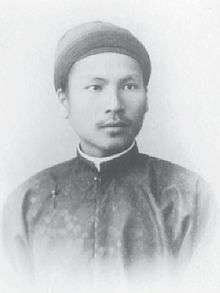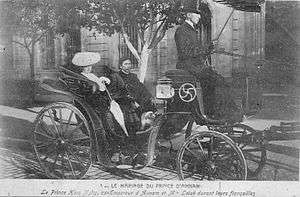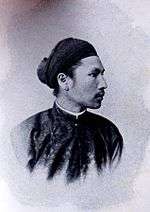Hàm Nghi
| Hàm Nghi | |||||
|---|---|---|---|---|---|
| Emperor of Đại Nam | |||||
 Emperor Hàm Nghi | |||||
| Emperor of Nguyễn Dynasty | |||||
| Reign | 1884–1885 | ||||
| Predecessor | Kiến Phúc | ||||
| Successor | Đồng Khánh | ||||
| Born |
3 August 1872 Huế, Việt Nam | ||||
| Died |
4 January 1943 (aged 70) Alger, Algérie, France | ||||
| Burial | Vigeois, Dordogne, France | ||||
| Spouse | Marcelle Laloe | ||||
| Issue |
Nguyễn Phúc Như Mai Nguyễn Phúc Như Lý Nguyễn Phúc Minh Đức | ||||
| |||||
| House | Nguyễn Dynasty | ||||
| Father | Nguyễn Phúc Hồng Cai, Prince of Kiên Thái | ||||
| Mother | Phan Thị Nhàn | ||||
Emperor Hàm Nghi (born Nguyễn Phúc Ưng Lịch, 3 August 1872 - 4 January 1943), was the eighth Emperor of the Vietnamese Nguyễn Dynasty. He reigned for only one year (1884–85).[1]
On 4 July 1885, a nationwide insurrection against the French broke out under the leadership of the two regents Nguyễn Văn Tường and Tôn Thất Thuyết. The French stormed the palace and Tôn Thất Thuyết took Emperor Hàm Nghi and three empresses into hiding. Hàm Nghi went to the hills and jungles around Laos along with Tôn Thất Thuyết's force. While they waged guerrilla warfare against the French occupation forces, the French replaced Hàm Nghi with his brother, Đồng Khánh, who was enthroned as the Son of Heaven. In October 1888, after a series of setbacks, Hàm Nghi was hiding in an isolated house near the spring of the Nai river, with Tôn Thất Thiệp, the second son of Tôn Thất Thuyết, and only a few attendants.[2] There, he was betrayed by the head of his Muong guards, Trương Quang Ngọc, and captured on 1 November, while Thiệp was killed. He was then turned over to French officers on 2 November.[3]
On 12 December 1888, he was exiled to Algeria. There he married a French Algerian woman named Marcelle Laloë on 4 November 1904. They had three children, Prince Minh-Duc, Princess Nhu May and Princess Nhu Lý. He died in 1943 and was buried in Thonac cemetery, near Sarlat, Dordogne, France.

In 2002, Vietnam sent a delegation to France to seek permission from Princess Nhu Lý (Countess De La Besse, died 2005, in her 97th year) to move her father's remains to the former Imperial capital of Huế. Her family has presently refused.[4] Most cities in Vietnam, regardless of the political orientation of the government, have named major streets after him.[5]

| Hàm Nghi | |
| Vietnamese name | |
|---|---|
| Vietnamese | Hàm Nghi |
| Hán-Nôm | 咸宜帝 |
| Birth name | |
| Vietnamese alphabet | Nguyễn Phúc Ưng Lịch |
|---|---|
| Hán-Nôm | 阮福膺𧰡 |
See also
| Wikimedia Commons has media related to Emperor Hàm Nghi. |
- Giao Hoang, who was Prime Minister at the time that the French took over
References
- ↑ Bruce M. Lockhart, William J. Duiker Historical Dictionary of Vietnam 2006 Page 150 "Hàm Nghi (1872-1943). Emperor (r. 1884—1885) of the Nguyén dynasty after establishment of the French protectorate in 1884. Brother of Emperor Kiến Phúc, ...
- ↑ Spencer Tucker -Vietnam - 1999 Page 36 "In july 1885 Vietnamese nationalists acting in the name of Emperor Hàm Nghi led a brief rebellion, launching a major attack on the French at the fort of Mang Cá near the capital. This failed, whereupon Hàm Nghi fled to Quang Tri Province and ..."
- ↑ Baille, 1890; Devillers, 1998, pp. 398–469; Gosselin, 1900, pp. 150–56; Gosselin, 1904.
- ↑ Nguyên Cao Duc, Georges. Un empereur aimé: Hàm Nghi 2007, p.5
- ↑ Vietnam Country Map. Periplus Travel Maps. March 2002. ISBN 0-7946-0070-0.
Bibliography
- Baille. "Souvenirs d’Annam 1886–1890" E. Plon, Nourrit et Cie, Paris (1890, viii + 266 pp.)
- Devillers, Philippe. "Français et Annamites. Partenaires ou ennemis? 1856–1902", Denoël, 1998, 517 pp.; ISBN 2-207-24248-X (2-207-24248-X)
- Gosselin, Charles. "Le Laos et le Protectorat Français". Librairie académique Didier, Perrin & Cie, Paris (1900, 349 pp.) Available here or here
- Gosselin, Charles. "L’empire d’Annam". Préface de Pierre Baudin, Perrin. Cie: Paris (1904, xxvi + 560 pp.)
- Bergoend, Isabelle. "Le Dagobert optique". Editions Thierry Marchaisse (2015, 240 pp.)
| Preceded by Emperor Kiến Phúc |
Nguyễn Dynasty | Succeeded by Emperor Đồng Khánh |